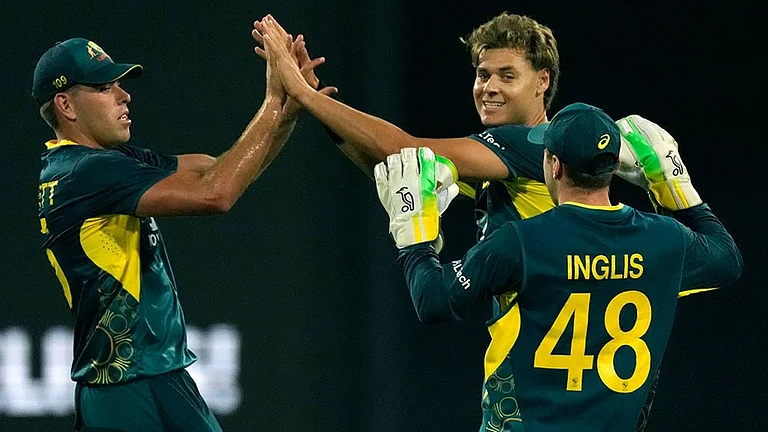The opening day of Monsoon Session of Parliament on Thursday transacted no business amid opposition parties' unrelenting demand for a discussion on the ongoing violence in Manipur. While the government agreed for a 'short-term' discussion under Rule 176, the Opposition pressed for suspending all business under Rule 267 and that the Prime Minister make a suo motu statement followed by a discussion.
The session started a day after a video of two women being paraded naked by a mob on May 4 in a Manipur village went viral, triggering a nationwide outrage. With the opposition MPs shouting slogans such as "Manipur Manipur" and "Manipur is burning", Parliament witnessed frequent adjournments before finally adjourning for the day.
What is Rule 267?
Under Rule 267, according to the Rajya Sabha rule book, a Rajya Sabha MP has the special power to suspend the pre-decided agenda of the House, with the approval of the Chairman.
The rule is defined as an instance where "any Member, may, with the consent of the Chairman, move that any rule may be suspended in its application to a motion related to the business listed before the council of that day and if the motion is carried, the rule in question shall be suspended for the time-being."
On the first day of the monsoon session, the Opposition pressed for a discussion on Manipur under this rule. However, Chairman Jagdeep Dhankhar said the government was “keen and agreeable” for discussion under Rule 176 for “Short Duration Discussion”.
Leader of the Opposition Mallikarjun Kharge then said, “We have also given notices under 267…..you have to suspend all other business and take up this…not half an hour.”
“Manipur is burning. Women are raped, naked, paraded and horrific violence is taking place. But the prime minister has kept quiet for so long. Today, after so much outrage, he gave a statement outside the Parliament. We want a detailed discussion on Manipur and PM Modi should make an elaborate statement on the same in the House. We also demand immediate resignation of Manipur chief minister and an imposition of President’s Rule,” he added.
Among the leaders who submitted this notice were Congress’ MPs Mallikarjun Kharge, Pramod Tiwari, Ranjeet Ranjan, Syed Naseer Hussain, Imran Pratapgarhi along with Priyanka Chaturvedi of Shiv Sena (UBT), Derek O’Brien of Trinamool Congress (TMC), Sanjay Singh of Aam Aadmi Party (AAP), Tiruchi Siva of Dravida Munnetra Kazagham (DMK), Manoj Jha of Rashtriya Janata Dal (RJD), Elamaram Kareem of CPM and Binoy Viswam of CPI.
However, the Rajya Sabha was eventually adjourned for the day amid protests.
What is the row over Rule 267?
Chairman Jagdeep Dhankar claimed last year that moving motions under this rule "has become a known mechanism of causing disruption". In the winter session, he had rejected eight such notices within two days, on issues such as the border dispute with China and rising prices of essential commodities. “You can trust me, if there is an occasion to invoke (rule) 267 every day, I would not hesitate to invoke it and if there is no occasion to invoke it even once during my entire tenure I would not. It (notice) will be examined on its own merits,” he had said, according to a report by Indian Express.
What is Rule 176?
The Centre on Monday said that it was willing to discuss the Manipur issue in Rajya Sabha and Leader of the House Piyush Goyal also said the government has no objections.
“Short duration discussion on Manipur issues has come to be demanded under Rule 176 by various members. Members are keen to engage in discussion on Manipur issues. These discussions have three stages, one, every member of the House is entitled to give a notice for short duration discussion. I have considered those notices but under the mandate of the rule, I have to consult the date and time from the Leader of the House,” VP Dhankhar had said.
Rule 176 allows for a short-duration discussion, not exceeding two-and-a-half hours, on a particular issue. It states that “any member desirous of raising discussion on a matter of urgent public importance may give notice in writing to the Secretary-General specifying clearly and precisely the matter to be raised: Provided that the notice shall be accompanied by an explanatory note stating reasons for raising discussion on the matter in question: Provided further that the notice shall be supported by the signatures of at least two other members.”
The matter can be taken up immediately, within a few hours or even the next day. However, no formal motion or voting shall be held under a short-duration discussion, as per Rule 176. The opposition has claimed that the government's insistence of discussion under Rule 176 might limit the discussion on Manipur.
Meanwhile, both Houses of the Parliament were adjourned today as well until noon amid uproar over the incidents in Manipur.


























